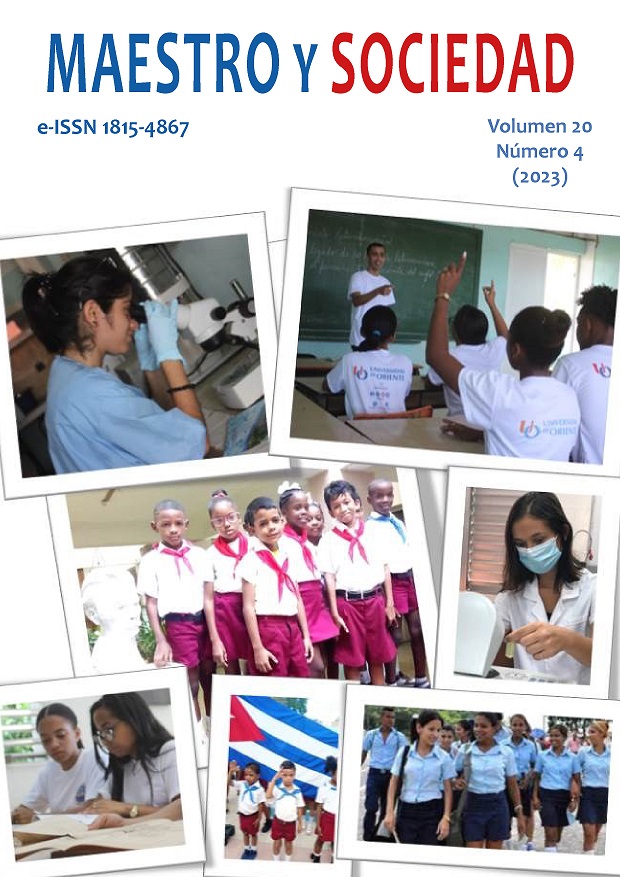Didactic strategy supported by digital tools for teaching mathematical problem solving in Elementary Education
Keywords:
problem solving, mathematics, GeoGebra, seventh grade students, didactic strategy, expert validationAbstract
Effective teaching of mathematical problem solving in seventh grade students is a critical aspect for their academic development. This exploratory study adopted a quantitative and qualitative approach to assess students' competence and teachers' needs in relation to problem solving and the use of GeoGebra in the teaching-learning process. The sample was composed of 33 seventh grade students of General Basic Education, as well as 21 mathematics teachers. Data collection methods included a student questionnaire and semi-structured interviews with teachers. The results
revealed a variability in the frequency of facing mathematical problems in the classroom, with a significant interest in the implementation of digital tools. Students expressed preferences regarding the use of GeoGebra and highlighted the importance of improving clarity in explanations and motivation for mathematical learning. Teacher interviews pointed
out specific challenges in teaching this population, as well as the perceived usefulness of GeoGebra compared to other approaches. Finally, a didactic strategy supported by GeoGebra was developed and validated through expert evaluation,
providing a valuable resource for improving the teaching of mathematical problem solving to seventh grade students.
References
Barham, A. I. (2020). Investigating the development of pre-service teachers’ problem-solving strategies via problem-solving mathematics classes. European Journal of Educational Research, 9(1), 129-141. https://doi.org/10.12973/eujer.9.1.129
García, J. G. J., & Izquierdo, S. J. (2017). GeoGebra, una propuesta para innovar el proceso enseñanza-aprendizaje en matemáticas. Revista electrónica sobre tecnología, educación y sociedad, 4(7).
Hernández-Sampieri, R., & Mendoza, C. (2020). Metodología de la investigación: las rutas cuantitativa, cualitativa y mixta. Mcgraw-hill.
Jacinto, H., & Carreira, S. (2023). Knowledge for teaching mathematical problem-solving with technology: An exploratory study of a mathematics teacher’s proficiency. European Journal of Science and Mathematics Education, 11(1), 105-122. https://doi.org/10.30935/scimath/12464
Kurniawati, I., Raharjo, T. J., & Khumaedi, K. (2021). Mathematical problem solving ability on problem based learning assisted by geogebra in primary school. Educational management, 10(1), 110-118.
Liljedahl, P., & Santos-Trigo, M. (2019). Mathematical problem solving. Springer International Publishing. https://doi.org/10.1007/978-3-030-10472-6
Marchisio, M., Remogna, S., Roman, F., & Sacchet, M. (2022). Teaching mathematics to non-mathematics majors through problem solving and new technologies. Education Sciences, 12(1), 34. https://doi.org/10.3390/educsci12010034
Mašín, D. (2019). [Springer Series in Geomechanics and Geoengineering] Modelling of Soil Behaviour with Hypoplasticity (Another Approach to Soil Constitutive Modelling) || Mathematical Problem Solving and the Use of Digital Technologies, 10.1007/978-3-030-03976-9(Chapter 4), 63–89. https://doi.org/10.1007/978-3-030-10472-6_4
Mato-Vázquez, D., Espiñeira, E., & López-Chao, V. A. (2017). Impacto del uso de estrategias metacognitivas en la enseñanza de las matemáticas. Perfiles educativos, 39(158), 91-111. https://doi.org/10.22201/iisue.24486167e.2017.158.58759
Poveda, W. (2020). Resolución de problemas matemáticos en GeoGebra. Revista do Instituto GeoGebra Internacional de São Paulo, 9(1), 26-42.
Santos-Trigo, M. (2020). Problem-Solving in Mathematics Education. In: Lerman, S. (eds) Encyclopedia of Mathematics Education. Springer, Cham. https://doi.org/10.1007/978-3-030-15789-0_129
Santos-Trigo, M., & Reyes-Martínez, I. (2019). High school prospective teachers’ problem-solving reasoning that involves the coordinated use of digital technologies. International Journal of Mathematical Education in Science and Technology, 50(2), 182-201. https://doi.org/10.1080/0020739X.2018.1489075
Şanal, S. Ö., & Elmali, F. (2023). Effectiveness of realistic math education on mathematical problem-solving skills of students with learning disability. European Journal of Special Needs Education, 1-18. https://doi.org/10.1080/08856/257.2023.2191110
Septian, A., Inayah, S., Suwarman, R. F., & Nugraha, R. (2020, August). GeoGebra-Assisted Problem Based Learning to Improve Mathematical Problem Solving Ability. In SEMANTIK Conference of Mathematics Education (SEMANTIK 2019) (pp. 67-71). Atlantis Press.
Siagan, M. V., Saragih, S., & Sinaga, B. (2019). Development of Learning Materials Oriented on Problem-Based Learning Model to Improve Students' Mathematical Problem Solving Ability and Metacognition Ability. International electronic journal of mathematics education, 14(2), 331-340.
Suratno, J., & Waliyanti, I. K. (2023). Integration of GeoGebra in Problem-Based Learning to Improve Students' Problem-Solving Skills. International Journal of Research in Mathematics Education, 1(1), 63-75. https://doi.org/10.24090/ijrme.v1i1.8514
Tambunan, H. (2019). The Effectiveness of the Problem Solving Strategy and the Scientific Approach to Students' Mathematical Capabilities in High Order Thinking Skills. International electronic journal of mathematics education, 14(2), 293-302. https://doi.org/10.29333/iejme/5715
Published
How to Cite
Issue
Section
License
Copyright (c) 2023 Carlos Darwin Córdova Briones, Esther María Briones Moreno, Gregory Edison Naranjo Vaca

This work is licensed under a Creative Commons Attribution-NonCommercial-NoDerivatives 4.0 International License.
This journal provides immediate open access to its content, based on the principle that offering the public free access to research helps a greater global exchange of knowledge. Each author is responsible for the content of each of their articles.



























 Universidad de Oriente
Universidad de Oriente 